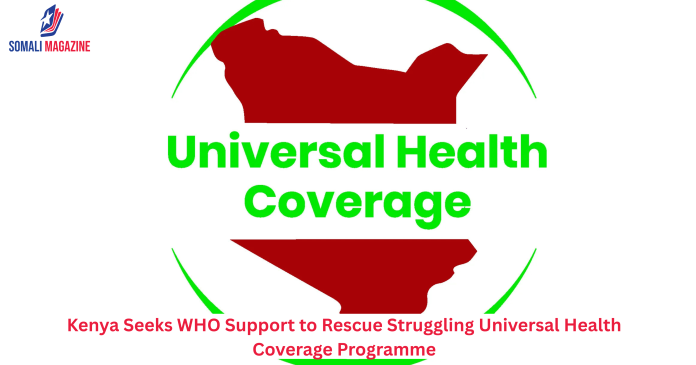Facebook Twitter (X) Instagram Somali Magazine - People's Magazine
Health CS Aden Duale Calls for Financial Aid and Stronger Collaboration with WHO Amid Budget Cuts and Protests by UHC Workers
Kenya is turning to the World Health Organization (WHO) to help strengthen and expand its Universal Health Coverage (UHC) programme, which has been facing financial difficulties and protests from health workers.
Health Cabinet Secretary (CS) Aden Duale made the appeal during a meeting with WHO Director-General Dr Tedros Adhanom Ghebreyesus on the sidelines of the 78th World Health Assembly held in Geneva. The theme of the assembly was “One World for Health.”
In a statement, CS Duale said he asked WHO to support Kenya’s efforts to speed up the implementation of UHC. He also requested financial assistance and technical support, especially in strengthening health financing and improving the country’s digital health systems. These systems would help in collecting and using health data to make better policy decisions.
“I held a bilateral meeting with the WHO Director-General to deepen Kenya’s collaboration with the organisation and support our health goals,” said Duale. “I called for WHO’s support in accelerating UHC, strengthening health financing, and advancing digital health infrastructure to drive data-informed policy.”
The CS also emphasised the importance of sustainable funding for WHO itself. He supported the idea of increasing member contributions to ensure WHO can continue its work effectively under its new plan for 2025–2028.
Back home, the Health Ministry has been struggling to secure long-term funding for the UHC programme. One of the main challenges is absorbing thousands of UHC health workers into permanent and pensionable positions. The government currently only has Ksh3.5 billion, which CS Duale says is enough to offer short-term contracts for nurses but not permanent jobs.
UHC was first introduced in Kenya in 2018 during former President Uhuru Kenyatta’s administration. The aim is to ensure all Kenyans have access to quality and affordable healthcare without experiencing financial hardship. Although the programme was piloted in 2018, it only started receiving significant funding in the 2021/2022 financial year.
In that year, the health sector was allocated Ksh130.4 billion, with Ksh47.7 billion going towards UHC. The following year, the health budget increased to Ksh146.8 billion, with Ksh62.3 billion earmarked for UHC—this was the highest amount ever allocated to the programme.
However, funding dropped in the 2023/2024 financial year to Ksh141.2 billion, with only Ksh18.4 billion set aside for UHC. In the current financial year, the health sector’s budget was reduced further to Ksh127 billion, with just Ksh4.2 billion allocated to UHC activities.
According to government estimates, Kenya needs around Ksh550 billion annually to fully implement UHC. However, the country currently spends only about Ksh247 billion on health, leaving a huge funding gap.
Meanwhile, UHC workers have been protesting outside the Ministry of Health offices, demanding permanent employment and better working conditions. The government has been criticized for failing to honour promises made to these workers.
CS Duale has insisted that the national government will not take full responsibility for paying UHC workers and wants county governments to handle their salaries instead. This move has caused tension between national and county governments and raised concerns about job security for thousands of healthcare workers.
As Kenya continues to push for better healthcare access, the success of UHC largely depends on finding sustainable funding and resolving ongoing issues with the health workforce. With support from global partners like WHO, the government hopes to keep the programme alive and ensure better health outcomes for all citizens.

